Five and a Half Years on Cabometyx, Near Complete Remission Achieved
A patient diagnosed with hepatocellular carcinoma—the second leading cause of cancer-related deaths in Korea—continues treatment into his eighth year after being given a six-month prognosis, drawing attention to the importance of personalized treatment.
Hepatocellular carcinoma (HCC) is often diagnosed late, as symptoms such as upper abdominal pain, indigestion, bloating, weight loss, and fatigue tend to appear only in advanced stages.
For patients with advanced (stage 4) HCC, the standard first-line therapy is a combination of the immunotherapy agents Tecentriq (atezolizumab) and Avastin (bevacizumab). Other options include targeted therapies such as Nexavar (sorafenib) and Lenvima (lenvatinib).
While these treatments appear diverse, immunotherapy only shows an objective response rate (ORR) of about 30%. Tumors may progress rapidly after first-line treatment, and liver function can deteriorate severely, posing life-threatening risks. This highlights the urgent need for effective second-line and later treatment options.
Additionally, many HCC patients have underlying chronic hepatitis or cirrhosis, making them more susceptible to severe side effects. Therefore, individualized treatment plans that take into account the patient’s specific risks are essential.
HIT News reports on the case of Ki-Chan Lee, a patient who was initially given a six-month prognosis after a stage 4 HCC diagnosis but has continued treatment for eight years. His progress is attributed to the use of Cabometyx, lifestyle improvements, and careful management of side effects. His physician, Professor Jung-Won Jang of the Gastroenterology Department at Seoul St. Mary’s Hospital, emphasized the importance of early diagnosis and understanding the unique characteristics of HCC.
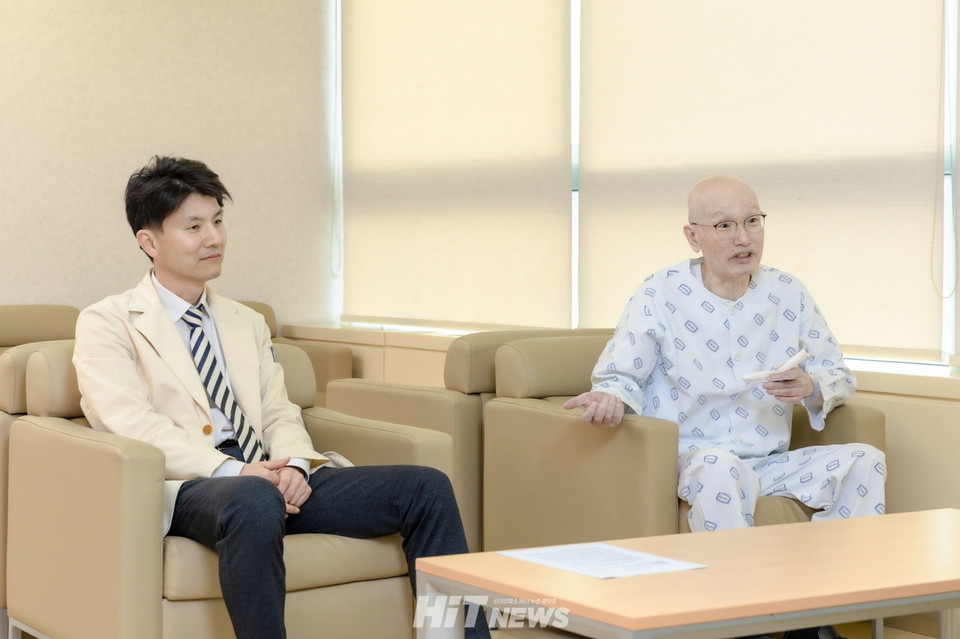
You must have been shocked when you were first diagnosed with hepatocellular carcinoma. Did you have any symptoms beforehand that raised suspicion?
Patient, Ki-Chan Lee: "At first, I had no reason to suspect liver cancer. I felt some abdominal tightness, but since I had been physically active, I assumed it was simply muscle strain. Then one day, I suddenly experienced severe abdominal pain and had to call emergency services. At the hospital, I was initially diagnosed with a liver abscess. However, even after antibiotic treatment, the mass didn’t shrink. The medical team decided to perform an MRI a week later, which revealed an 8 cm liver tumor.
When the doctors said, 'You have an 8 cm tumor in your liver,' my mind went completely blank. It was as if my body gave out and my thoughts just vanished. After returning home, I kept asking myself, 'Why me?' and 'Did I do something wrong to deserve this?'"
It must have been emotionally overwhelming. After your diagnosis, what kind of treatment journey have you been through?
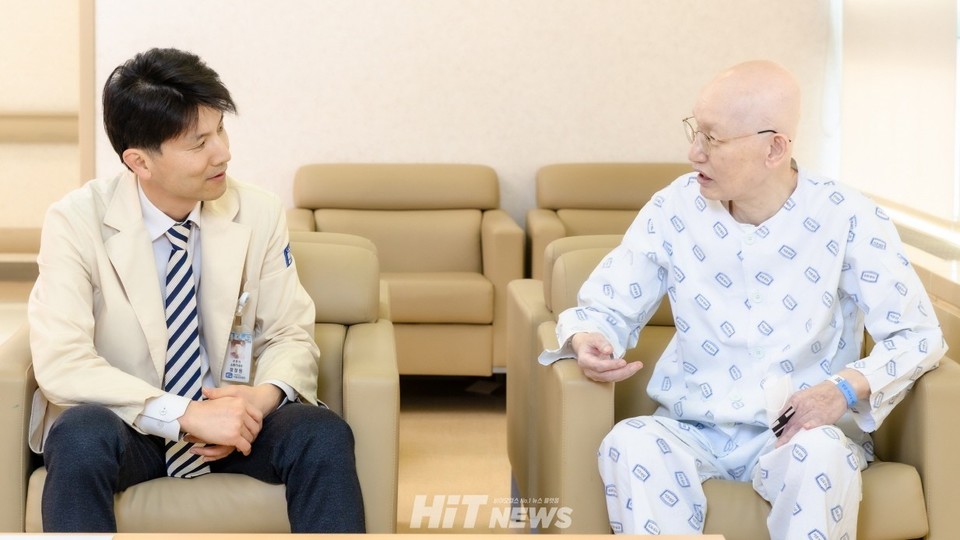
Patient, Ki-Chan Lee: "This year marks the eighth year since my diagnosis. Initially, the medical team believed surgery was not an option. I later learned that Professor Jang had told my family I had about six months to live. They chose not to tell me, so I continued treatment unaware of that prognosis.
I began with the first-line targeted therapy Nexavar (sorafenib), but within a year, I developed resistance. I then switched to Stivarga (regorafenib), but it was ineffective, and the cancer spread to my lungs and sacral bone.
Professor Jang explained that once the cancer spreads to the lungs and bones, it can easily metastasize to other organs, and the efficacy of future treatments may be limited. I then moved on to a third option, Opdivo (nivolumab), but it did not meet expectations either.
Finally, I started taking Cabometyx. At that time, it had only just been approved for liver cancer treatment in Korea, and there weren’t many clinical cases yet. I became one of the first patients in the country to be prescribed Cabometyx.
Professor Jang couldn’t promise results and simply asked, ‘Would you like to try this medication?’ From that moment, I felt Cabometyx might be my last option.
Fortunately, the results were positive. I've now been on Cabometyx for over five and a half years."
Professor Jung-Won Jang (Seoul St. Mary’s Hospital, Dept. of Gastroenterology): "The treatment response exceeded expectations. Within two months of starting Cabometyx, the patient’s tumor markers dropped to less than half, and his liver function, which had been severely impaired, showed rapid improvement.
Previously, the patient struggled with cachexia and inflammatory cytokine-related symptoms due to the tumor’s progression. After starting Cabometyx, the cancer began shrinking and his overall condition improved significantly.
His appetite returned, and by the third or fourth month, cancer-related indicators steadily improved. The metastatic nodules in his lungs visibly reduced, and lymph node metastases near the mediastinum and diaphragm also decreased substantially. The original liver tumor, which had measured about 8 cm, shrank to the point of near-complete remission (CR). Bone metastases also showed reduced activity on bone scans.
He has now been on Cabometyx for five and a half years. Globally, we have not seen another case like this. While more data is needed, it appears Mr. Lee may be the longest-surviving liver cancer patient on Cabometyx worldwide with sustained therapeutic response."
What has been the most difficult part of your liver cancer treatment journey?
Patient, Ki-Chan Lee: "Side effects vary from person to person, but for me, the most difficult one was diarrhea. There were nights I went to the bathroom more than ten times, sometimes staying up all night because of it.
Once everything in my body had emptied out, it would subside temporarily. But I still needed to eat for my health, so I developed my own coping strategy: ‘Eat, then go.’ I figured that if I couldn’t avoid the diarrhea, I should at least try to absorb some nutrients before it hit. That mindset helped me get through it.
I also worked with my doctor to adjust the dosage from the standard 60mg to 40mg. I keep anti-diarrheal medication and stomach protectants at home as a preventive measure and take them as needed. Over time, I became familiar with the pattern of the side effects and was able to manage my daily life without too much disruption."
Many liver cancer patients are especially concerned about weight loss. What kind of diet do you follow to manage your nutrition?
Patient, Ki-Chan Lee: "I try to maintain a consistent and balanced eating routine. In the morning, I start with an apple. For lunch, I blend apples, kiwis, cherry tomatoes, carrots, broccoli, and bamboo salt into a juice. In the evening, I eat a regular meal that includes rice and soup.
Since protein is essential, I also make sure to include items like blanched octopus, fried eggs, and steamed shark meat with my meals."
Cancer treatment can be an overwhelming and frightening process for many patients. Do you have any advice to share?
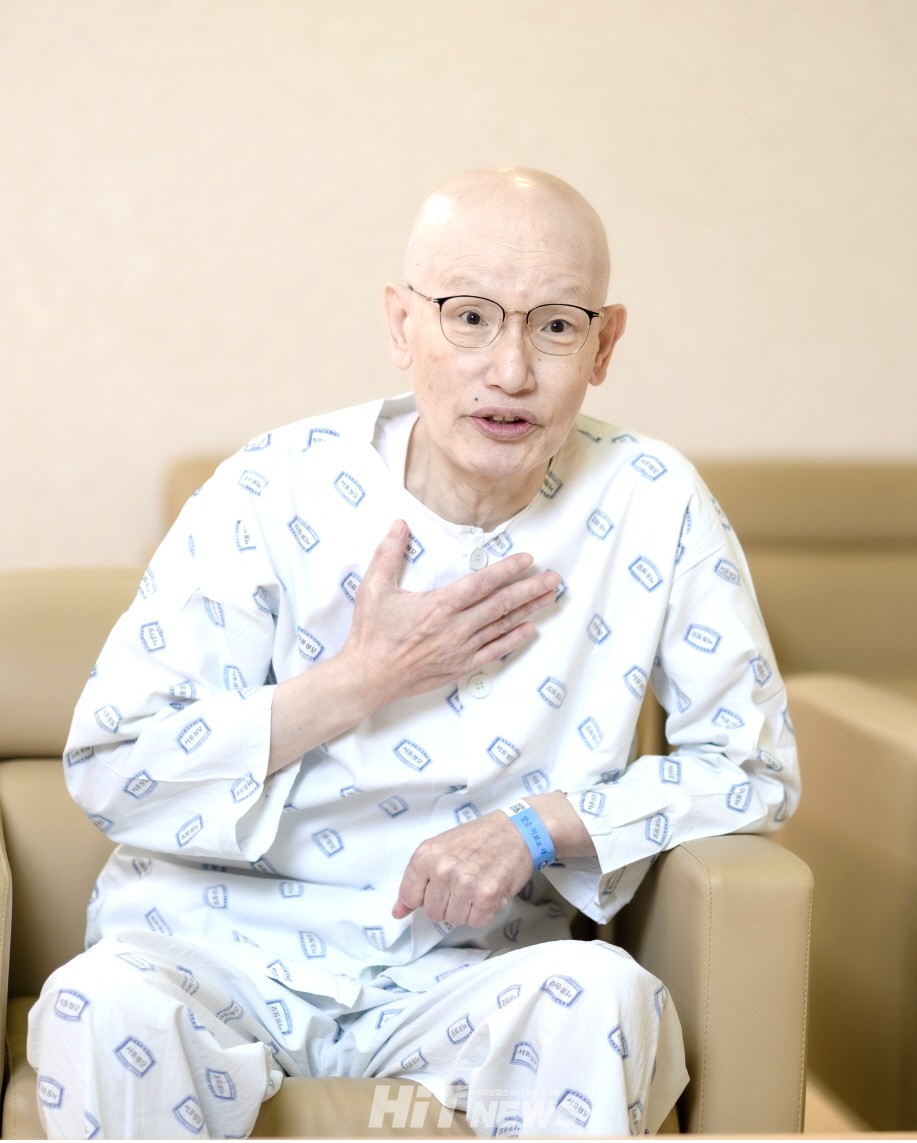
"I believe the most important thing is to maintain communication with your doctor. You should always talk to your doctor to make the best treatment decision for yourself.
Throughout my journey, whenever one treatment didn’t work, my doctor immediately switched to the next option without delay. I think those quick decisions were key to achieving positive outcomes.
Just as every person’s body is different, I believe there’s a specific cancer drug that suits each individual. With so many new therapies now available, finding the right match can make a huge difference. Even patients with late-stage cancer, like myself, can live much longer if they’re matched with the right treatment.
I want to stress that what matters most isn’t simply a ‘good drug’—it’s the drug that works best for your body. That’s why it’s crucial to respect your doctor’s expertise and follow the treatment plan closely. And of course, maintaining proper nutrition is just as important as staying on top of your treatments.
I once gained hope from hearing about a fellow late-stage cancer patient who had been fighting for over ten years. I hope that by sharing my story through this interview, I can offer the same kind of hope and encouragement to others facing cancer."
Why is hepatocellular carcinoma often detected only after it has significantly progressed?
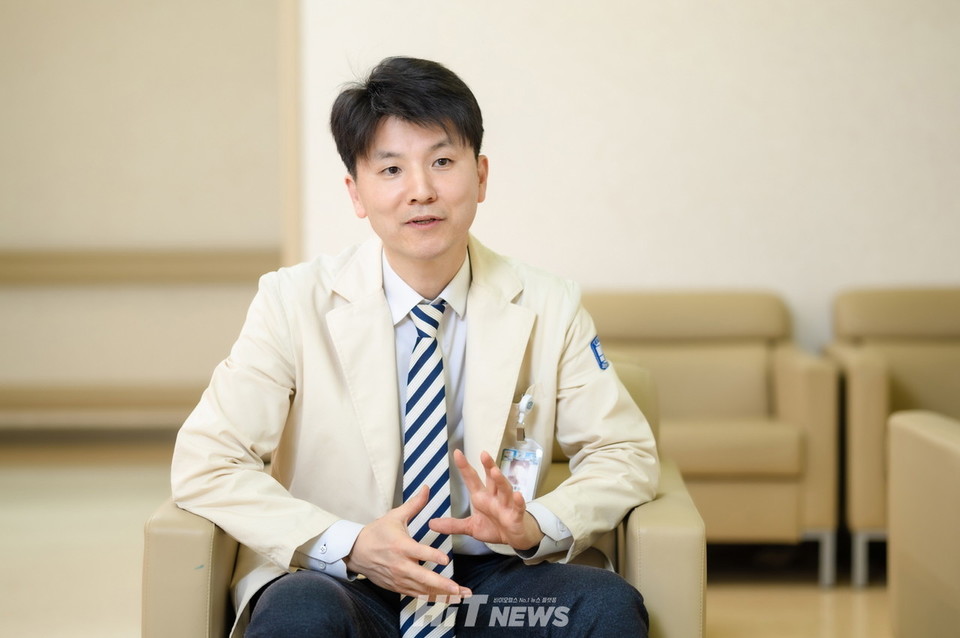
Professor Jang: "One of the main reasons is that liver cancer typically does not present with noticeable symptoms in its early stages. As a result, it’s often discovered incidentally during imaging tests conducted for other reasons.
For example, I recently treated a patient who had a tumor measuring around 12 cm, yet experienced no symptoms at all. This is why regular screening and surveillance are absolutely critical for early detection.
In Korea, the most common cause of liver cancer is hepatitis B, which accounts for about 70% of all cases. Patients with such risk factors must be especially vigilant. Fortunately, there are effective preventive and treatment options—hepatitis B has a vaccine, and hepatitis C now has a cure.
Additionally, the government has launched a national survey to assess hepatitis C prevalence and offers a one-time screening for all individuals at age 56 as part of a life-transition health checkup. If someone tests positive for hepatitis C, they are linked to appropriate medical care through the national 'Link to Care' program, ensuring timely treatment and management."
What are the main methods used to screen for liver cancer?
Professor Jang: "Liver cancer is the only cancer that can be diagnosed without a tissue biopsy. The two primary screening methods are a blood test for alpha-fetoprotein (AFP) and a liver ultrasound. In Korea, the government provides regular screening support for high-risk individuals aged 40 and above.
The importance of early detection in liver cancer cannot be overstated, as survival rates vary significantly depending on when the cancer is diagnosed.
When liver cancer is found early through surveillance testing, most cases can be completely cured. In fact, many patients achieve full recovery thanks to early screening. Unfortunately, many people still think, 'It won’t happen to me,' and delay getting tested.
Even if you have no symptoms, if you fall into a high-risk group—such as ① anyone with cirrhosis regardless of cause, ② hepatitis B patients aged 40 or older, or ③ those with hepatitis C—it is strongly recommended to undergo screening every six months. Early detection is key, and regular check-ups make that possible."
How does treatment for liver cancer differ by stage?
Professor Jang: "According to Korean clinical guidelines, early-stage liver cancer is typically treated with surgical interventions such as liver transplantation or tumor resection, as well as local therapies like radiofrequency ablation (RFA).
For intermediate-stage liver cancer, the standard treatment is transarterial chemoembolization (TACE), which delivers chemotherapy directly to the tumor via the hepatic artery while blocking its blood supply.
In advanced-stage liver cancer—previously referred to as terminal-stage—the first-line treatments in Korea include targeted therapies like Nexavar (sorafenib) and Lenvima (lenvatinib), as well as combination immunotherapies such as Tecentriq + Avastin and Imfinzi + Imjudo.
For second-line or later treatments, options available in Korea include Stivarga (regorafenib), Cabometyx (cabozantinib), immunotherapies based on Opdivo (nivolumab), and Cyramza (ramucirumab), depending on the patient's condition and response to prior treatment."
What have clinical studies shown about the efficacy of Cabometyx?
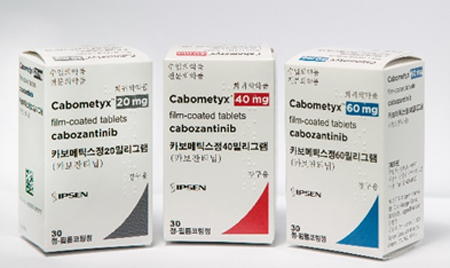
Professor Jang: "In the CELESTIAL trial, which evaluated Cabometyx as a second-line treatment for patients with advanced liver cancer following Nexavar, the drug significantly extended overall survival (OS) compared to placebo. The median OS was extended by over two months (10.2 months vs. 8.0 months; HR=0.76, 95% CI: 0.63–0.92, p=0.005).
Progression-free survival (PFS) also showed marked improvement, with a median of 5.2 months in the Cabometyx group compared to 1.9 months in the placebo group (HR=0.44, 95% CI: 0.34–0.52, p<0.001). Based on these results, Cabometyx was approved as a second-line treatment for advanced hepatocellular carcinoma.
However, as patients progress to second-line therapy, the tumor burden tends to increase, and most patients also have underlying cirrhosis, which leads to declining liver function. A limitation of Cabometyx is that it can only be used in patients with preserved liver function.
It’s also worth noting that the 2022 trial investigating Cabometyx in combination with Tecentriq as a first-line therapy did not succeed, which remains a point of disappointment."
Ki-Chan Lee’s case offers hope to many. Do you have a message of encouragement for other liver cancer patients who may be looking for similar outcomes?
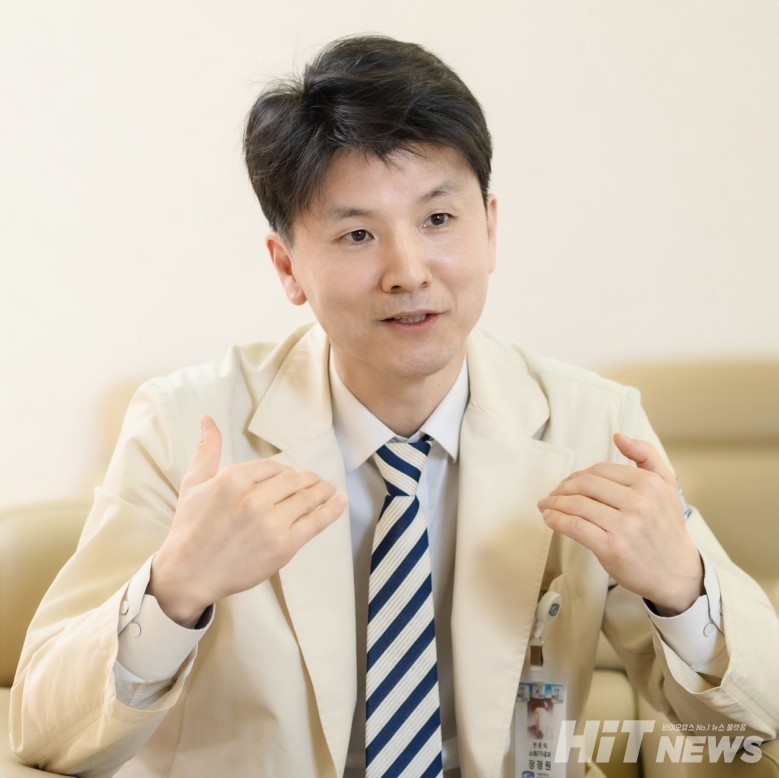
Professor Jang: "With the advancement of precision medicine and the emergence of targeted therapies, personalized treatment based on individual patient characteristics has become increasingly important. Just as each person’s appearance is unique, so too are the nature and genetic profile of each patient’s cancer.
From a precision medicine standpoint, Cabometyx was an excellent match for Mr. Lee. However, that doesn’t mean the same drug will produce identical results for everyone.
Today, there are far more treatment options available than in the past. Still, there is no single 'correct' choice when it comes to systemic therapies for liver cancer. That’s why it is essential for patients to consult with a specialist, have in-depth discussions, and find the treatment that best aligns with their specific clinical and genetic profile.
The journey may be difficult, but I truly believe that with persistence and tailored care, patients can access better treatment outcomes and improved care environments moving forward. Please don’t give up."

